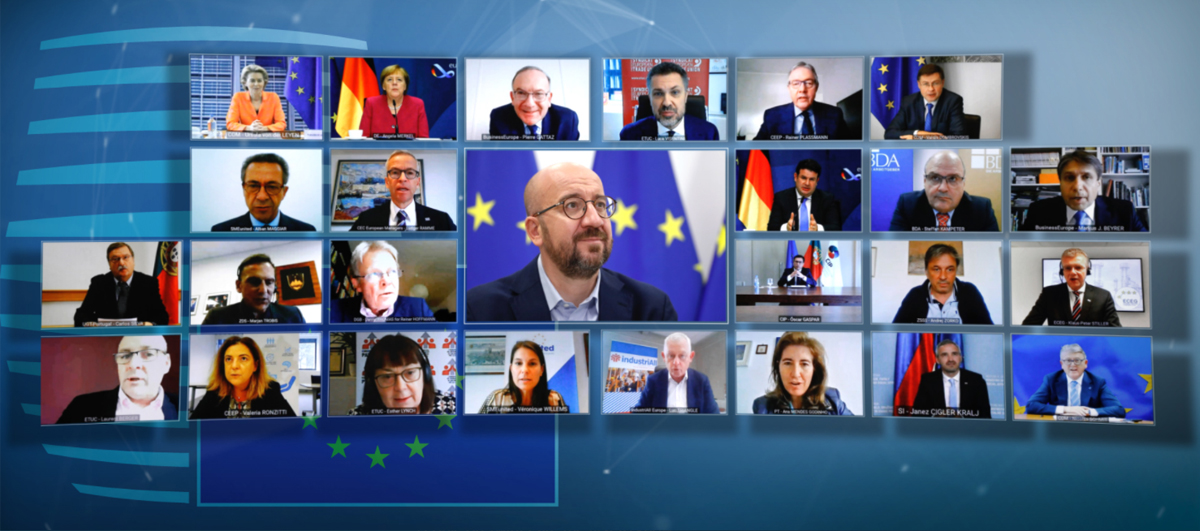BusinessEurope Headlines No. 2020-33
Implementing together an inclusive economic and social recovery in Europe

Speaking at the Tripartite Social Summit on 14 October, BusinessEurope’s President Pierre Gattaz highlighted that all the EU actions during the next year must focus on making sure that the financial package, agreed by the European Council in July to recover from the COVID-19 crisis, reaches enterprises and workers rapidly. “Boosting investment to create new jobs and supporting viable businesses of all sizes, in particular SMEs, as well as their workers should be at the core of Europe’s crisis response”, he said. This, Gattaz added, requires investing in the right projects and implementing the necessary reforms to generate the growth necessary to recover from today's crisis, and make the life of future generations better. Besides the strong focus on the green and digital transitions, BusinessEurope welcomes the strengthening of key industrial value chains and ecosystems as well as essential EU infrastructures and services of general interest. As European employers, our priority is to make sure that the financial support under the new Multiannual Financial Framework (MFF) and Next Generation EU enables enterprises to invest, grow and create jobs. Read his full speech.
![]() Contact: Maxime Cerutti
Contact: Maxime Cerutti
Photo copyright: European Council
EU free trade agreements: how to maximise their benefits
More than 36 million EU jobs depend on exports outside the EU. As the number of free trade agreements keeps growing, how do we make sure that they are fully implemented and that companies of all sizes can seize the opportunities they provide?
Our comment
Single Market: additional reports or conclusions do not remove barriers to business
By Martynas Barysas, Director for Internal Market
 Every crisis is a wake-up call to re-think some of the issues which have been either “parked” or lacking ideas on how to be resolved in order to move forward. Some of the crises are an alarm bell that is loud and sharp, like the COVID-19 with all the health, economic and other societal repercussions it is bringing. On the economic front, the disruptions COVID-19 brought and is still bringing about in the Single Market are huge, a flood of unilateral uncoordinated restrictions at borders by Member States in spring hit at the industrial value chains and cross-border provision of services by unprecedented scope. The outcomes of this were detrimental to both European businesses and citizens who experienced chaos in supplies when they needed them most. This is what happens when the Single Market freedoms are severely disrupted.
Every crisis is a wake-up call to re-think some of the issues which have been either “parked” or lacking ideas on how to be resolved in order to move forward. Some of the crises are an alarm bell that is loud and sharp, like the COVID-19 with all the health, economic and other societal repercussions it is bringing. On the economic front, the disruptions COVID-19 brought and is still bringing about in the Single Market are huge, a flood of unilateral uncoordinated restrictions at borders by Member States in spring hit at the industrial value chains and cross-border provision of services by unprecedented scope. The outcomes of this were detrimental to both European businesses and citizens who experienced chaos in supplies when they needed them most. This is what happens when the Single Market freedoms are severely disrupted.
The four Single Market freedoms have been looked at with suspicion by numerous political powers for the last ten years, many reasons for that. Any further significant removal of barriers to open markets within the EU has been stalling with neither the European Commission nor the Member States or the European Parliament having a bold view on the needed compromise since Mario Monti’s report on A New Strategy for the Single Market in 2010. And suddenly the pandemic came, bringing the Single Market up to the heights of political discussions among EU heads of state and government, ministers and administrations of Member States alike. The Single Market debate is gaining the necessary links to Europe’s ambition to lead in green and digital transitions. Take a new look at its economic base and search for more “strategic autonomy”, “technological sovereignty” or whatever the label one chooses. One thing is clear, all agree that Europe has a chance of coming out from this crisis stronger, and for this to happen, merely restoring the Single Market to its pre-crisis shape will not be enough.
How far have we gone on a more solid Single Market to use this chance so far? While addressing the burning Single Market issues in the immediate term was a natural top priority before the summer break, new discussions on the short-to-mid-term priorities for the Single Market have brought extremely little in the EU. The Competitiveness Council conclusions “on a deepened Single Market for a strong recovery and a competitive, sustainable Europe”, adopted on 21 September, seems to be yet another paper with neatly polished statements and no real commitments or decisions. Member States take their time to refer to at least five sets of previously adopted conclusions with some of the well-known slogans about the “importance” of and the need to “deepen and strengthen” the Single Market. Noteworthy is the reference to the European Council call, quote, “for a more integrated approach connecting all relevant policies and dimensions and with regard to the Single Market in all its dimensions (aspects) for a long-term strategy that is bold, all-encompassing and forward-looking”. Yes, that’s a quote. Apart from many other things one might learn from this kind of policy making, we could also take it as acknowledgement that some of the EU’s strategies are backward-looking and that the EU is indeed in need of a compass…
On 2 October, the European Council adopted a set of the summit conclusions covering, inter alia, the economic pillar on the Single Market, digital, industrial policy and Europe’s ambition on the “strategic autonomy”. Guidelines on the Single Market in this document rest on the old news, such as a nearly romantic call to remove “remaining unjustified barriers, particularly in the area of services” and refrain from creating new ones, a long overdue endorsement of the Commission’s action plan on implementation and enforcement, and a confirmation of the already known short-term intentions in some areas such as the competition framework and online platforms.
The only real action foreseen in recent Council texts is yet another “strategic” report on the Single Market that should become annual, first due by 15 January 2021. Europe has - yet another - opportunity to put concrete decisions on the removal of Single Market barriers into this Commission report. The newly established Single Market Enforcement Taskforce, a joint Single Market implementation watchdog of the Commission and Member States, might be an important body to help us all in removing the Single Market barriers.
BusinessEurope stands ready to assist in providing the necessary evidence from our business community and has already tabled its suggestions in our position paper on the Single Market governance package as well as the first series of examples of barriers published in September. We will build up our work on this further but we should make no mistake in believing that the Taskforce will solve it all. The EU needs a broader and longer-term politically backed direction for the “deepened and strengthened” Single Market. We might need to revert to the overall compromise package approach that was attempted by Monti 10 years ago but fell into pieces way too soon, leaving us with the Council conclusions of the kind mentioned above. We need decisions, no more extensive conclusions or calls for additional reports without reporting on the decisions which actually remove barriers. The alarm bell is ringing, please do not put on snooze again. Heavy oversleeping is bad for health.
![]() Contact: Martynas Barysas
Contact: Martynas Barysas
New Access2Markets portal is key to promoting use of FTAs
 On 13 October 2020, the European Commission’s new Access2Markets portal was officially launched. It contains information about tariffs, customs, product rules and more, all tailored to the needs of small and medium-sized firms. It also includes a Rules of Origin self-assessment tool, the ROSA. In her intervention during the portal’s launch event, Luisa Santos, Deputy Director General of BusinessEurope, stated: “It is important that, through its trade policy, the EU creates more opportunities for companies, especially SMEs. Access2Markets will make these opportunities more tangible and hopefully also more granular, as we need to focus more in areas such as trade in services and public procurement”. She added that ensuring coordination and complementarity between different instruments is essential in this regard. Commenting more broadly on the question of enforcement, Santos continued: “Safeguarding European interests in the implementation of trade policy should be a priority for the new Chief Trade Enforcement Officer. This is, for instance, the case of extraterritorial implementation of foreign legislation, such as in the area of sanctions”.
On 13 October 2020, the European Commission’s new Access2Markets portal was officially launched. It contains information about tariffs, customs, product rules and more, all tailored to the needs of small and medium-sized firms. It also includes a Rules of Origin self-assessment tool, the ROSA. In her intervention during the portal’s launch event, Luisa Santos, Deputy Director General of BusinessEurope, stated: “It is important that, through its trade policy, the EU creates more opportunities for companies, especially SMEs. Access2Markets will make these opportunities more tangible and hopefully also more granular, as we need to focus more in areas such as trade in services and public procurement”. She added that ensuring coordination and complementarity between different instruments is essential in this regard. Commenting more broadly on the question of enforcement, Santos continued: “Safeguarding European interests in the implementation of trade policy should be a priority for the new Chief Trade Enforcement Officer. This is, for instance, the case of extraterritorial implementation of foreign legislation, such as in the area of sanctions”.
Contact: Sofia Bournou
Ambitious EU trade policy essential in the recovery from COVID-19
 “Maintaining an open trade and investment policy in the post-COVID-19 era will contribute to the recovery from the pandemic and should be a priority for the EU in the context of its Trade Policy Review”, said Sofia Bournou, Senior Adviser at BusinessEurope’s International Relations Department at an event organised on 8 October by “Enterprise Greece”, the Greek trade promotion authority. Bringing together experts from international institutions, the event was an opportunity to discuss the impact of the pandemic in the EU’s economy, the particular measures the EU has adopted to address the crisis and support European businesses as well as the role of trade in the recovery phase. To this end, Bournou argued that trade policy and trade agreements in particular can play a key role. They are tools that liberalise trade by increasing access to markets and by including rules that help level the playing field. At the same time, they are also promoting sustainable trade and the EU’s values worldwide. As the EU’s trade policy is increasingly focusing on implementation, it is important to (1) make sure that rules are clear and simple to use by companies of all sizes; (2) increase awareness on trade agreements, especially at national level with the help of trade promotion authorities and business associations; and (3) focus on enforcement by making sure that trade and investment barriers are identified early and effectively addressed. The European Commission is currently working on reinforcing the EU’s toolbox in this regard.
“Maintaining an open trade and investment policy in the post-COVID-19 era will contribute to the recovery from the pandemic and should be a priority for the EU in the context of its Trade Policy Review”, said Sofia Bournou, Senior Adviser at BusinessEurope’s International Relations Department at an event organised on 8 October by “Enterprise Greece”, the Greek trade promotion authority. Bringing together experts from international institutions, the event was an opportunity to discuss the impact of the pandemic in the EU’s economy, the particular measures the EU has adopted to address the crisis and support European businesses as well as the role of trade in the recovery phase. To this end, Bournou argued that trade policy and trade agreements in particular can play a key role. They are tools that liberalise trade by increasing access to markets and by including rules that help level the playing field. At the same time, they are also promoting sustainable trade and the EU’s values worldwide. As the EU’s trade policy is increasingly focusing on implementation, it is important to (1) make sure that rules are clear and simple to use by companies of all sizes; (2) increase awareness on trade agreements, especially at national level with the help of trade promotion authorities and business associations; and (3) focus on enforcement by making sure that trade and investment barriers are identified early and effectively addressed. The European Commission is currently working on reinforcing the EU’s toolbox in this regard.
Contact: Sofia Bournou
Ensuring the Next Generation instrument delivers on growth and jobs
 BusinessEurope welcomed the Director of the European Commission's Recovery and Resilience Taskforce, Maria Teresa Fabregas Fernandez, to a virtual discussion on 9 October. During the event, representatives from both BusinessEurope's member federations and the Advisory and Support Group were briefed by Fabregas Fernandez on the guidance for Member States to develop their recovery and resilience plans, which the Commission services have recently published. Many members emphasised the importance of ensuring the money is used wisely to boost growth and jobs, with the full involvement of social partners in the development and delivery of the plans essential to achieve this goal. BusinessEurope also continues to urge for a rapid agreement between the EU institutions on the legal texts establishing the recovery instrument to ensure funds are available from 1 January 2021.
BusinessEurope welcomed the Director of the European Commission's Recovery and Resilience Taskforce, Maria Teresa Fabregas Fernandez, to a virtual discussion on 9 October. During the event, representatives from both BusinessEurope's member federations and the Advisory and Support Group were briefed by Fabregas Fernandez on the guidance for Member States to develop their recovery and resilience plans, which the Commission services have recently published. Many members emphasised the importance of ensuring the money is used wisely to boost growth and jobs, with the full involvement of social partners in the development and delivery of the plans essential to achieve this goal. BusinessEurope also continues to urge for a rapid agreement between the EU institutions on the legal texts establishing the recovery instrument to ensure funds are available from 1 January 2021.
Contact: James Watson
Future EU Consumer Agenda should not forget the basics
 The future EU Consumer Agenda has an important role in the green and digital transformation. Bringing consumers and businesses together in this transformation will not be accomplished by legislation alone. Awareness raising, training and communication are important to change deep-rooted mindsets. The future Agenda should also not overlook the essentials. In addition to consumer protection, European consumer policy should also be used as an enabler for businesses to better take advantage of the benefits of operating in the Single Market. Reducing administrative burden, fighting legal fragmentation and practising continuous evaluation of existing rules in view of the technological development continue to be a must to be able to foster growth and jobs, even more important for a swifter recovery. These are some of the main messages of BusinessEurope’s reply to the recent public consultation in view of the creation of the future EU Consumer Agenda.
The future EU Consumer Agenda has an important role in the green and digital transformation. Bringing consumers and businesses together in this transformation will not be accomplished by legislation alone. Awareness raising, training and communication are important to change deep-rooted mindsets. The future Agenda should also not overlook the essentials. In addition to consumer protection, European consumer policy should also be used as an enabler for businesses to better take advantage of the benefits of operating in the Single Market. Reducing administrative burden, fighting legal fragmentation and practising continuous evaluation of existing rules in view of the technological development continue to be a must to be able to foster growth and jobs, even more important for a swifter recovery. These are some of the main messages of BusinessEurope’s reply to the recent public consultation in view of the creation of the future EU Consumer Agenda.
![]() Contact: Pedro Oliveira
Contact: Pedro Oliveira
Defining markets correctly is crucial for an effective competition policy
 BusinessEurope has responded to the European Commission’s consultation regarding the evaluation of the Notice on the definition of relevant market for the purposes of Community competition law. Although the fundamentals of the Notice are still valid, the Commission should further develop how geographical markets are to be determined, not only taking into consideration trade patterns, as it is currently stated, but also the development on global markets, investment and merger patterns.
BusinessEurope has responded to the European Commission’s consultation regarding the evaluation of the Notice on the definition of relevant market for the purposes of Community competition law. Although the fundamentals of the Notice are still valid, the Commission should further develop how geographical markets are to be determined, not only taking into consideration trade patterns, as it is currently stated, but also the development on global markets, investment and merger patterns.
![]() Contact: Erik Berggren
Contact: Erik Berggren
Calendar 
- 19-22 October: EU Green Week
- 22 October: What trade can do for climate - Apero webinar 2/3: Bilateral actions
- 5-6 November: Third policy learning forum on upskilling pathways: a vision for the future
Reminder: please have a look at our privacy policy